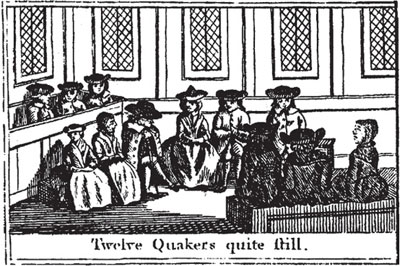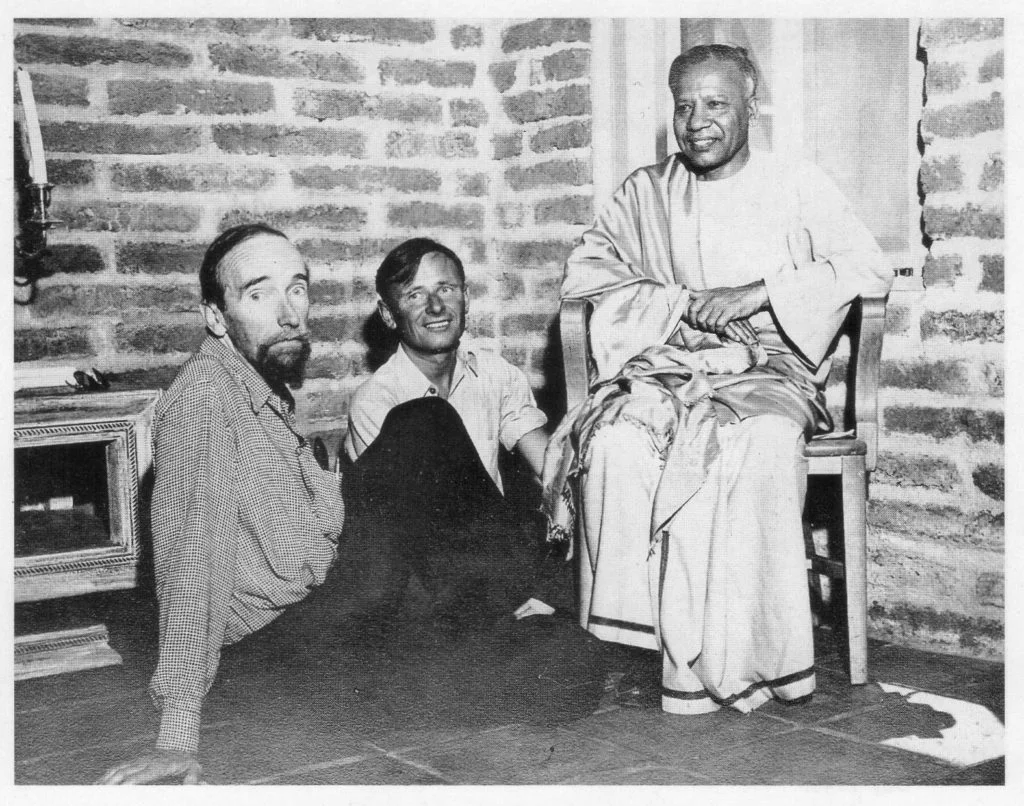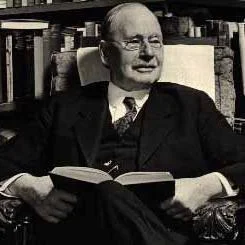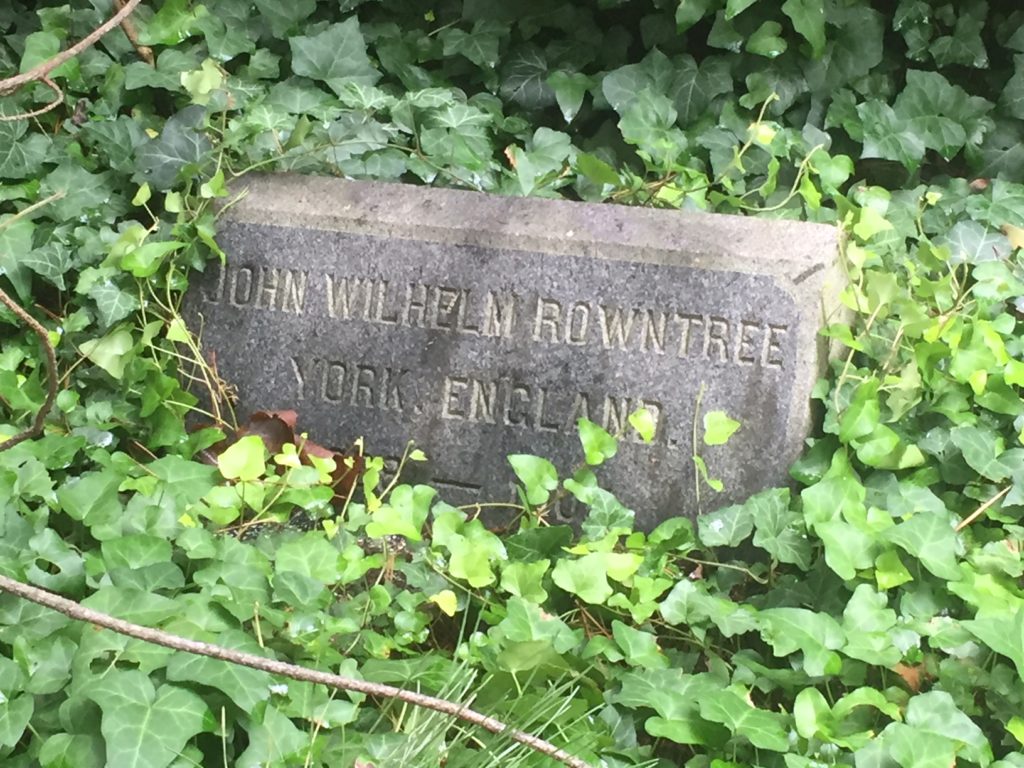The Quakers on how to balance inner and outer work
Last week I visited Pendle Hill, a Quaker retreat centre outside Philadelphia, nestled between the gorgeous Quaker liberal arts colleges of Haverford and Swarthmore. I made a sort of mini-pilgrimage there as part of my research into the ‘mystical expats’ – Gerald Heard, Aldous Huxley, Christopher Isherwood and Alan Watts, four English writers who moved to California in the 1930s and helped invent the ‘spiritual-but-not-religious’ demographic (which is now 25% of the US population).
Gerald Heard is the least remembered of the four, but in many ways, he was their guiding light. In the early 30s, he was a BBC science journalist, the Brian Cox of his day, who became interested in the idea of man’s social and spiritual evolution. He thought the next stage of man’s evolution would involve an exodus beyond tribal authoritarian religion - people would learn to practice and study techniques for self-transformation from a variety of religions, testing them out with empirical psychology. He called for new institutions of education – somewhere between a monastery and a college – where adults could come to study and practice these psycho-spiritual techniques, thereby sparking man’s evolution to a higher level of group consciousness.
This marriage of psychology and contemplation was very influential for Huxley and Isherwood, for the founders of Esalen (the 60s adult development college in Big Sur), and for western spirituality in general. In fact, it’s only in the last decade that contemplative science has become mainstream, and contemplative education has begun to influence university curricula. Heard’s vision is still ahead of our time.
During World War Two, Heard and Isherwood both spent a lot of time at Pendle Hill. Heard wrote several pamphlets for the Pendle Hill press on Quaker topics, and helped set up a Quaker journal on contemplation, called Inner Light. For a while, he thought the Quakers could be the vanguard for the next stage in western culture’s spiritual evolution. Quakers didn't claim a monopoly on salvation - they thought all humans have an 'inner light' connecting them to God. They rejected ritual and priestly hierarchy; and they still practiced a rudimentary form of meditation in their silent worship. He hoped there might be a contemplative revival in the Quakers, as they absorbed insights from ancient contemplative practices and modern depth psychology.
But how would this contemplative revival fit with the Protestant focus on good works, on mission and evangelism, on social action, bearing witness to injustice, and the burning question of what to do in response to Nazi aggression? Heard and Huxley had been prominent pacifists in the UK. But in the US, with the war in full swing, both seemed to withdraw from politics and go within. Heard declared that a peaceful politics was impossible with man at his present level of evolution – humans needed to evolve to a higher stage of consciousness. Until we did the inner work, all outer work would end badly.
This is an important question for our own time. I’m part of the culture that Heard et al helped usher in – ‘spiritual but not religious’, psychologically literate, trying to do inner work while not joining any particular religion. But this path risks becoming selfish, spiritually proud, consumerist and individualist. At the same time, I've seen too many people who dedicate their lives to charitable or development work burning out and doing damage to themselves because they’re not taking care of their own souls. So how do we balance care of our souls with the outer work of trying to build a fairer and kinder world?
One Quaker who thought a lot on this question was Rufus Jones, who Isherwood ironically dubbed ‘the Pope of Quakerism’. Jones taught philosophy at Haverford College and often visited nearby Pendle Hill. He was a great friend of an ancestor of mine, Yorkshire Quaker John Wilhelm Rowntree. The two met in the 30s and immediately felt a spiritual affinity.
Both of them were mystically-inclined – JW Rowntree had a spiritual experience in his 30s, after being told by a doctor that he was rapidly going blind. He left the clinic, walked out into the streets of York, and suddenly felt filled with the inner light of God’s love. Jones, meanwhile, travelled across the Atlantic to visit JW Rowntree, and on the journey he woke up in his cabin and felt a sense of anguish. That was succeeded by a deep sense of peace, love and divine support. On arriving in England, he discovered his beloved son had died that night.
Jones and Rowntree felt a shared sense of mission. They wanted to reframe Quakerism as a liberal, mystical religion, an empirical spirituality flexible enough to respond to scientific and historical criticism, which recognized the value of spiritual experiences in other religious traditions. But they also wanted to show, through historical research, that this mystical Qnuaker religion was not some flaky modern innovation, but a re-connection to a deep, central tradition in Christianity.
So they embarked on a project to re-position the Quakers within this mystical tradition, thereby uniting the warring liberal and traditionalist factions of the Quakers and re-animating the movement for the sceptical and scientific 20th century. Alas, JW Rowntree died aged 37, while visiting Jones in Philadelphia. I discovered on this trip that he’s buried next to Jones in the Quaker cemetery in Haverford, a few miles from Pendle Hill. I went there and found a corner of a foreign field that is forever Yorkshire.
Jones continued the project alone, and wrote Studies in Mystical Religion and many other books and essays on mysticism. He helped to reframe the idea of mysticism for American readers, who still had the traditional Protestant suspicions of the word: mysticism was considered introvert, solitary, morbid, sectarian, and completely opposite to the American cheery, practical, civic ethos.
Jones rebranded mysticism by insisting it meant simply ‘direct first-hand fellowship with God, and the deepened life-results that emerge’. The true mystic feels a ‘marked increase in joy’ and an increase in productivity and effectiveness too: ‘Under the creative impact of their experience, they have become hundred-horse-power persons, with a unique striking force against gigantic forms of evil and with a remarkable quality of leadership’. Very American eh? The mystic as super-powered manager.
Jones is a pretty biased historian of mysticism. He rejects almost all medieval monasticism – except for the Franciscans – and prefers obscure Protestant dissenter movements like the Brotherhood of Eternal Love and the Seekers (it’s thanks to Jones’ fascination with this 17th-century group that we got the modern term ‘seeker’ for restless spiritual searchers). He also barely discusses eastern mysticism and its attempt to overcome the illusion of this world. The true mystic, for Jones, doesn’t deny the world – they affirm it and work vigorously to improve it.
The Quakers have, of course, been incredibly effective at reforming the world. Although a tiny denomination with rarely more than a hundred thousand members, Quakers were at the forefront of the movement to abolish slavery; they led humane reforms in asylums and prisons; they did important work in supporting the minimum wage and the introduction of the welfare state (particularly thanks to JW Rowntree’s brother, Seebohm); they have a central role in the history of adult education and adult literacy; and they’ve also played a key role in championing pacifism and non-violent resistance.
Jones found time, while teaching philosophy at Haverford College and writing histories of mysticism, to help set up the American Society of Friends Committee (ASFC), which re-settled thousands of Jewish refugees during the war – Christopher Isherwood volunteered for them and lived at Haverford for a year or so. The ASFC also helped feed a million German children after the war. They were awarded the Nobel Peace Prize in 1947.
I personally find Quaker contemplation a bit limited. To me, it’s too non-hierarchical, too non-structured. There is no sense of the structured journey through the psyche that one finds in Buddhism or medieval mysticism, nor any sense that we need guides and rituals on that journey. It’s like an orchestra where no one admits that some people play better than others, and sometimes you need teachers, a conductor and a score.
I’ve often criticized the tendency towards guru-worship in Buddhism and Hinduism. But perhaps the Quakers go too far the other way. People need help and guidance in tapping the deep well of consciousness within them. I’m not surprised that the Quaker renaissance that Heard called for didn’t happen, and that instead millions of westerners turned to Eastern practices like Vipassana, Zen, yoga, Daoism and Vajrayana Buddhism. We want to be taught by contemplative experts.
Nonetheless, the Quakers – and Rufus Jones – have an important message for us. What’s the point of all this inner work if it doesn’t make us kinder and less egocentric, if it doesn’t turn us outwards towards our fellow beings, including particularly those who are hungry, homeless, rejected, uneducated, locked up and abused? How can we combine eastern contemplative practices with Christianity’s emphasis on not accepting the world as it is, but rather trying to improve it? How do we avoid spiritual pride and the idolatry of priest-worship?
The Quakers also show us the importance of socializing your spirituality, connecting it to networks of friends and groups. It’s when our spirituality is knitted together with others into a quilt of community that we become much more effective at working to help others. As a chronic individualist, I need to remember this.




